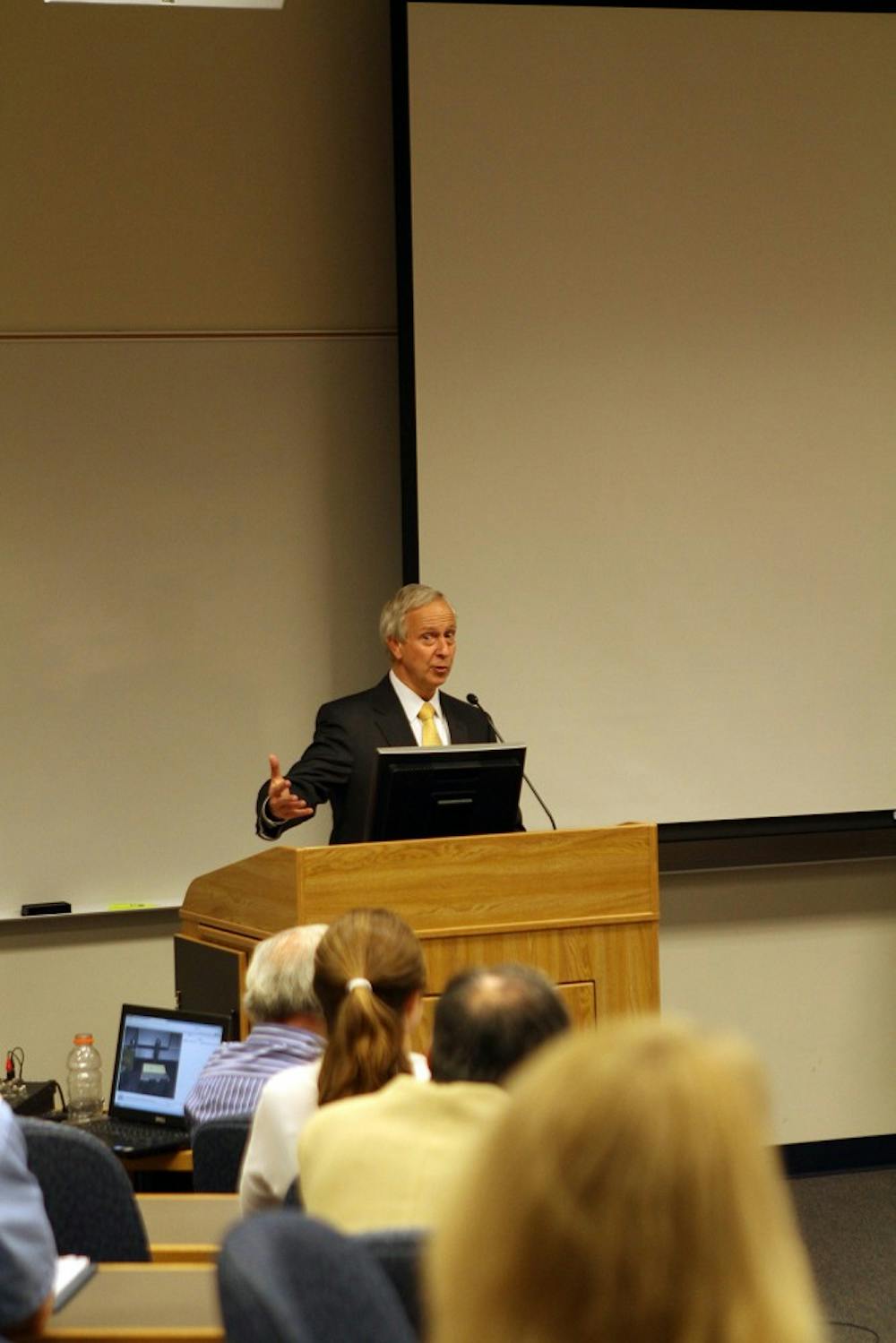President Richard Brodhead reflected on the University’s history and increasing efforts for greater equity Thursday.
In his address at the Annual Meeting of the University Faculty, Brodhead discussed issues of race and inclusion in Duke’s history, noting the topic’s relevance in light of the recent controversy over an unpublished study exploring the correlation between GPA and race. Brodhead explained that although the University thrives on free expression, views that students believe diminish their standing at the University warrant an institutional response.
“This University has had a commitment to making Duke a place of access, opportunity and mutual respect for all,” Brodhead said. “This commitment was confirmed in Duke’s most recent strategic plan, and I reconfirm the commitment today.”
In January, several students and members of Black Student Alliance presented administrators with the Black Culture Initiative—a list of recommendations regarding the problems facing the black community at Duke. Although the initiative prompted discussion between students and the administration, Brodhead did not reference the initiative directly in the address but did allude to some of the suggestions it presented. BSA recommended that the administration increase funding for cultural events and outline the role, if any, of special considerations in the admissions policy, among others.
Brodhead said the University takes multiple factors into account during admissions, such as standardized test scores as well as students’ characters, and will continue to recruit highly qualified students from every background. The Supreme Court decided Feb. 21 to hear Fisher v. The University of Texas, which challenges the constitutionality of affirmative action. Duke will be joining with other universities in filing an amicus brief to support a holistic approach to the admissions process.
Brodhead added that the University has made much progress in affording opportunities for black students and faculty. The report follows the recent allocation of $13,000 from the Office of the Provost to fund various groups who are participating in Black Student Alliance Invitational, the recruitment weekend for prospective black students.
BSAI has attracted some controversy in recent years, as some members of the Duke community stress that the event misrepresents the goals of the University in focusing on one target group.
During his time at Yale University, Brodhead played a significant role in removing minority-targeted recruitment events. He has previously said that he preferred a racially unified invitation for all admitted students.
After the speech, however, Brodhead said in an interview that the current system of BSAI is successful, and he is in full support of the program.
“There is no debate about the aims we are pursuing in attracting top applicants from various backgrounds,” Brodhead said. “It’s only the question of means—what is the best way to convey to the best applicants that Duke is a good fit?”
Going forward, Brodhead has requested that each academic and administrative unit produce an annual report on the status and goals of diversity within each group. These reports will be reviewed and aggregated in a final report for the Duke community every other year. Brodhead also affirmed a commitment to freedom of expression among scholars and students alike.
The University has come a long way in broadening the faculty and student body in recent years, Brodhead said. He noted that the number of blacks appointed to regular rank faculty in all schools at Duke has risen from 44 in 1993 to 140 in 2011. Additionally, between 9 and 11 percent of Duke’s entering freshman class have been black, a statistic rivaled only by Stanford University and Columbia University among Duke’s peer institutions.
He stressed that although Duke has many praiseworthy accomplishments, much work is needed. He compared the successes and inadequacies of the institution’s diversification efforts to his administration. Since his arrival as president, Brodhead has incorporated leaders of various backgrounds—including two blacks, one Asian American and one woman. Brodhead noted that he would like to instate more female senior administrators, adding that there has not yet been a black dean of any school.
“We’re never totally there—living up to these ideals will always be a work in progress—and the nature of the challenges continues to evolve with larger changes in our society,” Brodhead said.
Several faculty members responded positively to Brodhead’s address and focus on the University’s journey and progress with diversity.
Lee Baker, Trinity College of Arts & Sciences dean of academic affairs and associate vice provost for undergraduate education, said the report served as a “great reminder of the arc of Duke’s effort to diversity.” He added that he was especially pleased with the University’s decision to support the pending amicus brief.
Brodhead’s speech also encouraged some faculty to reflect on how they will personally incorporate his goals.
“I am glad that he raised the questions of race and diversity, reiterating our goals to make diversity something we work on and own collectively in a non-episodic way,” Dean of Arts and Sciences Laurie Patton said. “I am personally going to work very hard on this with a number of different units in the community.”
Get The Chronicle straight to your inbox
Signup for our weekly newsletter. Cancel at any time.

